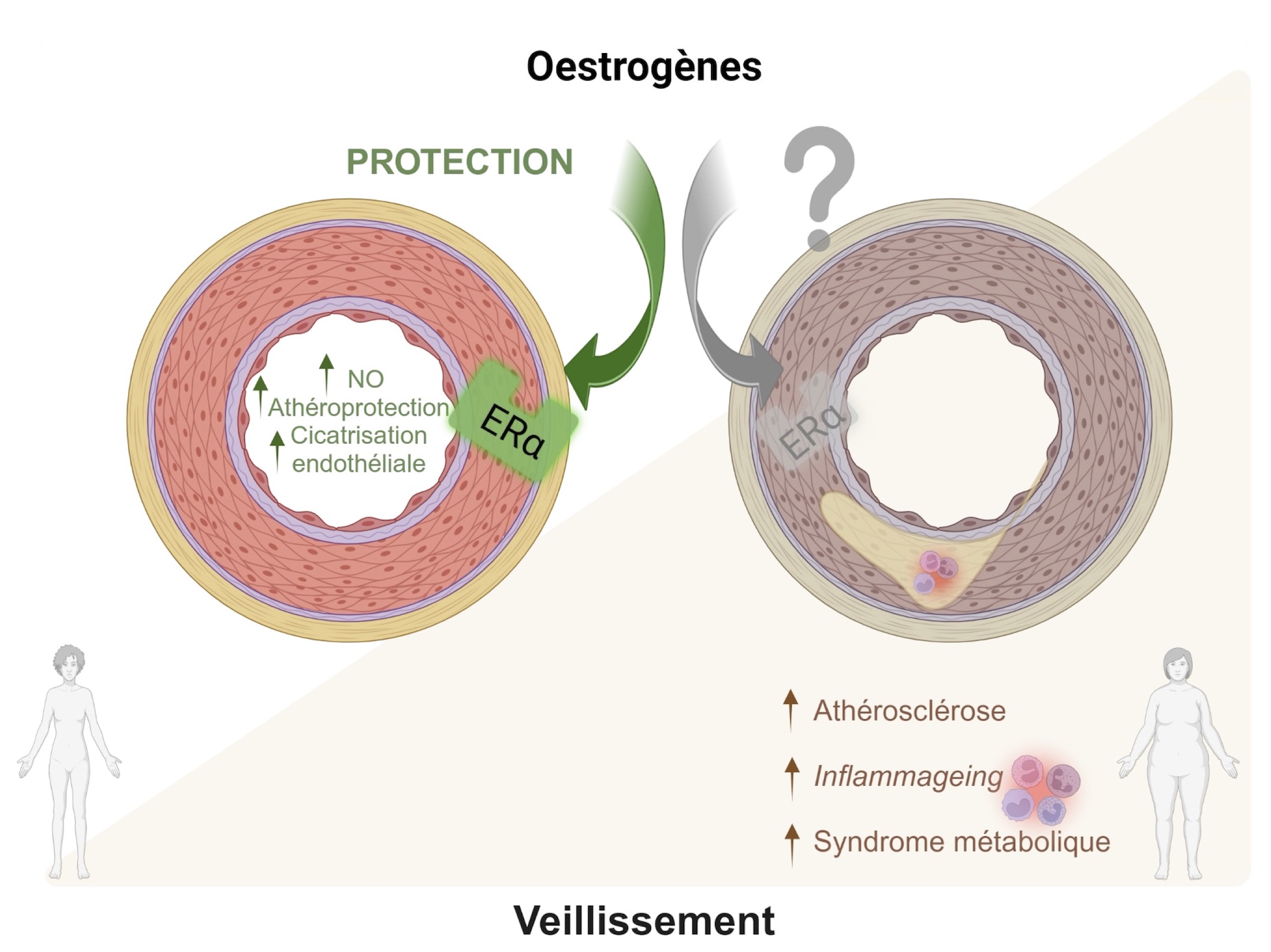| Issue |
Med Sci (Paris)
Volume 40, Number 10, Octobre 2024
|
|
|---|---|---|
| Page(s) | 729 - 736 | |
| Section | M/S Revues | |
| DOI | https://doi.org/10.1051/medsci/2024115 | |
| Published online | 25 October 2024 | |
Récepteurs des œstrogènes et vieillissement artériel
Estrogen receptors and vascular aging
1
Inserm U1297, Institut des maladies métaboliques et cardiovasculaires (I2MC), Université de Toulouse 3 Toulouse France
2
Université d’Angers, département MITOVASC, équipe CarMe, Inserm U1083, CNRS UMR 6015 Angers France
Les maladies cardiovasculaires (MCV) sont souvent perçues comme étant principalement masculines, alors qu’elles représentent la première cause de mortalité chez les femmes. Bien que les effets bénéfiques des œstrogènes soient bien établis chez les organismes jeunes, la question de savoir si les œstrogènes exogènes peuvent prolonger la protection contre les MCV après le début de la ménopause n’est toujours pas résolue. Cette revue décrit les études sur les effets des œstrogènes sur les artères, en mettant l’accent sur l’impact du vieillissement sur l’endothélium. Nous aborderons également l’impact de l’âge sur l’expression et la signalisation des récepteurs des œstrogènes (ER), avant d’exposer le progrès des connaissances sur les mécanismes d’action d’ERα afin d’optimiser le traitement hormonal de la ménopause.
Abstract
After years of studying cardiovascular diseases (CVD) in men due to their higher incidence compared to women, attention is now being paid to female CVD and their pathophysiology. Even though premenopausal women have a lower incidence of CVD, this disparity progressively diminishes after menopause, highlighting the key role of sex hormones. Many preclinical and fundamental studies have demonstrated protective effects of estrogens on arterial endothelium, suggesting that hormone therapy could improve cardiovascular health in menopausal women. However, disappointing outcomes from a major clinical trial two decades ago questioned the cardiovascular protection by estrogens with age. In this review, we will summarize the main clinical and experimental studies reporting the effects of estrogens on CVD, with a focus on their impact on endothelial function. Then, we will present abnormalities in the expression and signaling of estrogen receptors (ERs) in the arteries, and the contribution of conventional estrogens to arterial protection during aging. Finally, we will examine how recent advances in the mechanisms of action of ERa could help to optimize hormone therapy for menopause.
© 2024 médecine/sciences – Inserm
 Article publié sous les conditions définies par la licence Creative Commons Attribution License CC-BY (https://creativecommons.org/licenses/by/4.0), qui autorise sans restrictions l’utilisation, la diffusion, et la reproduction sur quelque support que ce soit, sous réserve de citation correcte de la publication originale.
Article publié sous les conditions définies par la licence Creative Commons Attribution License CC-BY (https://creativecommons.org/licenses/by/4.0), qui autorise sans restrictions l’utilisation, la diffusion, et la reproduction sur quelque support que ce soit, sous réserve de citation correcte de la publication originale.
Current usage metrics show cumulative count of Article Views (full-text article views including HTML views, PDF and ePub downloads, according to the available data) and Abstracts Views on Vision4Press platform.
Data correspond to usage on the plateform after 2015. The current usage metrics is available 48-96 hours after online publication and is updated daily on week days.
Initial download of the metrics may take a while.





